
The Bolsheviks, led by Vladimir Lenin, were a far-left faction of the Marxist Russian Social Democratic Labour Party (RSDLP) which split with the Mensheviks at the Second Party Congress in 1903. The Bolshevik party seized power in Russia in the October Revolution of 1917, and was later renamed the Communist Party of the Soviet Union. Their ideology and practices, based on Leninist and later Marxist–Leninist principles, are known as Bolshevism.

The Russian Revolution was a period of political and social change in the Russian Empire, starting in 1917. This period saw Russia abolish its monarchy and adopt a socialist form of government following two successive revolutions and a bloody civil war. The Russian Revolution can also be seen as the precursor for the other European revolutions that occurred during or in the aftermath of World War I, such as the German Revolution of 1918–1919.

The Russian Civil War was a multi-party civil war in the former Russian Empire sparked by the overthrowing of the social-democratic Russian Provisional Government in the October Revolution, as many factions vied to determine Russia's political future. It resulted in the formation of the Russian Socialist Federative Soviet Republic and later the Union of Soviet Socialist Republics in most of its territory. Its finale marked the end of the Russian Revolution, which was one of the key events of the 20th century.
Bolshevism is a revolutionary socialist current of Soviet Leninist and later Marxist–Leninist political thought and political regime associated with the formation of a rigidly centralized, cohesive and disciplined party of social revolution, focused on overthrowing the existing capitalist state system, seizing power and establishing the "dictatorship of the proletariat".

Pavel Nikolayevich Milyukov was a Russian historian and liberal politician. Milyukov was the founder, leader, and the most prominent member of the Constitutional Democratic party. He changed his view on the monarchy between 1905 and 1917. In the Russian Provisional Government, he served as Foreign Minister, working to prevent Russia's exit from the First World War.
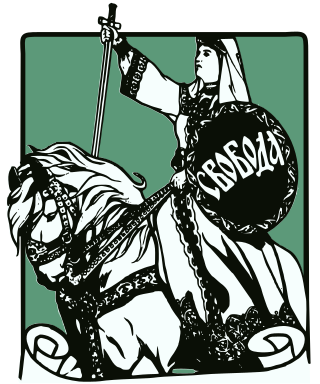
The Constitutional Democratic Party, also called Constitutional Democrats and formally the Party of People's Freedom, was a political party in the Russian Empire that promoted Western constitutional monarchy—among other policies—and attracted a base ranging from moderate conservatives to mild socialists. Party members were called Kadets from the abbreviation K-D of the party name. Konstantin Kavelin's and Boris Chicherin's writings formed the theoretical basis of the party's platform. Historian Pavel Miliukov was the party's leader throughout its existence.
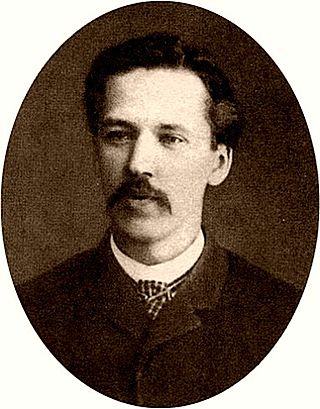
Sergei Vasilyevich Zubatov was a Russian Empire police administrator, best known as the advocate of "police socialism", which included creating legal, police-controlled trade unions.

The Union of the Russian People (URP) is a loyalist far-right nationalist political party, the most important among Black-Hundredist monarchist political organizations in the Russian Empire between 1905 and 1917. Since 2005, organizational cells of the Union have been undergoing a revival in Russia and Ukraine.

The Black Hundred, also known as the black-hundredists, were a reactionary, monarchist and ultra-nationalist movement in Russia in the early 20th century. It was a staunch supporter of the House of Romanov and opposed any retreat from the autocracy of the reigning monarch. The name arose from the medieval concept of "black", or common (non-noble) people, organized into militias.
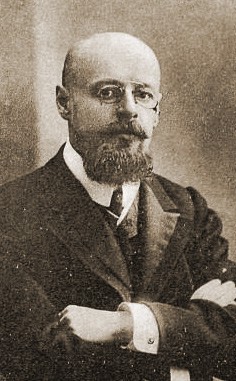
Vladimir Mitrofanovich Purishkevich was a far-right politician in Imperial Russia, noted for his monarchist, ultra-nationalist, antisemitic and anticommunist views. Because of his restless behaviour, he was regarded as a loose cannon. At the end of 1916, he participated in the killing of Grigori Rasputin.

Orlando Guy Figes is a British historian and writer. Until his retirement, he was Professor of History at Birkbeck College, University of London.

The Left SR uprising, or Left SR revolt, was a rebellion against the Bolsheviks by the Left Socialist Revolutionary Party in Moscow, Soviet Russia, on 6–7 July 1918. It was one of a number of left-wing uprisings against the Bolsheviks that took place during the Russian Civil War.

Nikolay Ernestovich Bauman was a Russian revolutionary of the Bolshevik Party.
The accusation that Joseph Stalin was antisemitic is much discussed by historians. Although part of a movement that included Jews and rejected antisemitism, he privately displayed a contemptuous attitude toward Jews on various occasions that were witnessed by his contemporaries, and are documented by historical sources. In 1939, he reversed Communist policy and began a cooperation with Nazi Germany that included the removal of high profile Jews from the Kremlin. As dictator of the Soviet Union, he promoted repressive policies that conspicuously impacted Jews shortly after World War II, especially during the anti-cosmopolitan campaign. At the time of his death, Stalin was planning an even larger campaign against Jews. According to his successor Nikita Khrushchev, Stalin was fomenting the doctors' plot as a pretext for further anti-Jewish repressions.

The Vyborg Manifesto ; also called the Vyborg Appeal) was a proclamation signed by several Russian politicians, primarily Kadets and Trudoviks) of the dissolved First Duma on 22 July [O.S. 9 July] 1906.
Censorship of images was widespread in the Soviet Union. Visual censorship was exploited in a political context, particularly during the political purges of Joseph Stalin, where the Soviet government attempted to erase some of the purged figures from Soviet history, and took measures which included altering images and destroying film. The USSR curtailed access to pornography, which was specifically prohibited by Soviet law.

Dmitry Nikolaevich Shipov was a Russian liberal Slavophile politician of the 19th and 20th centuries.
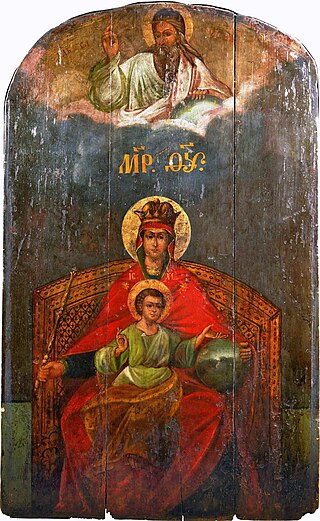
Our Lady Derzhavnaya is a Russian icon believed to date from the 18th century. According to Irina Yazykova, the Reigning Icon, "remains one of the most revered both inside Russia and in Russian emigre circles. Copies of the Reigning Icon of the Mother of God can now be found all over the world."
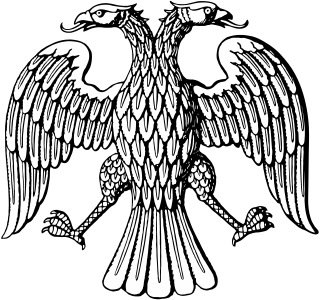
The All Russian Constituent Assembly was a constituent assembly convened in Russia after the February Revolution of 1917. It met for 13 hours, from 4 p.m. to 5 a.m., 18–19 January [O.S. 5–6 January] 1918, whereupon it was illegally dissolved by the Bolshevik-led All-Russian Central Executive Committee, proclaiming the Third All-Russian Congress of Soviets the new governing body of Russia.

Julius Martov or L. Martov was a Russian politician, revolutionary and the leader of the Mensheviks, a faction of the Russian Social Democratic Labour Party (RSDLP). A close associate of Vladimir Lenin, Martov broke with him following the RSDLP ideological split, after which Lenin led the opposing faction, the Bolsheviks.

















